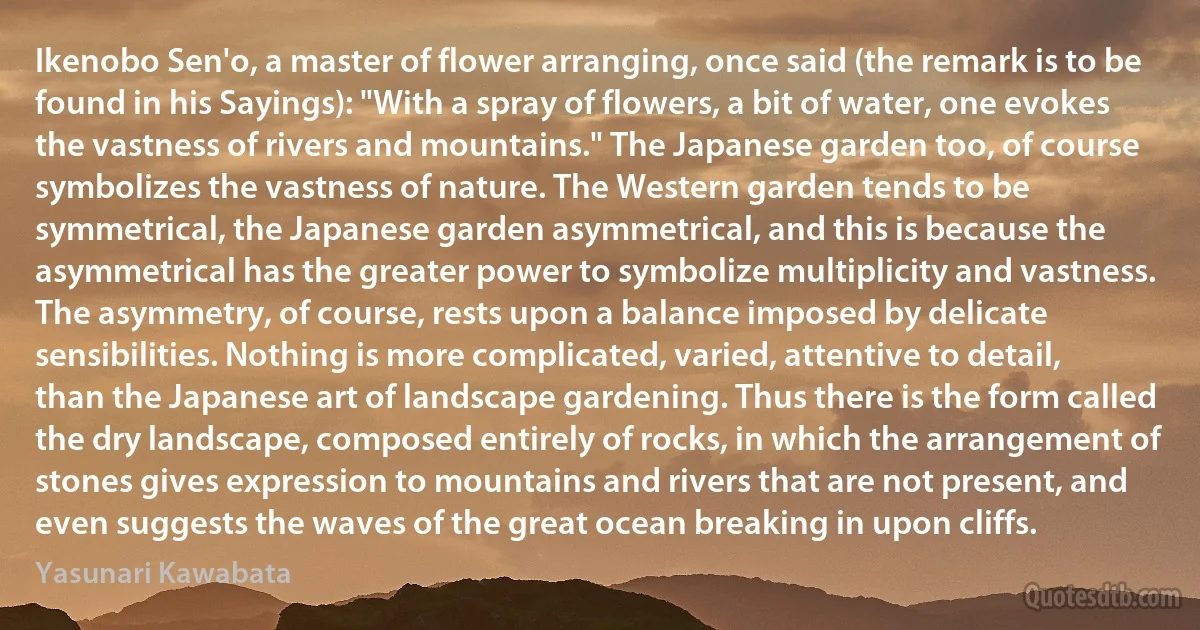
Ikenobo Sen'o, a master of flower arranging, once said (the remark is to be found in his Sayings): "With a spray of flowers, a bit of water, one evokes the vastness of rivers and mountains." The Japanese garden too, of course symbolizes the vastness of nature. The Western garden tends to be symmetrical, the Japanese garden asymmetrical, and this is because the asymmetrical has the greater power to symbolize multiplicity and vastness. The asymmetry, of course, rests upon a balance imposed by delicate sensibilities. Nothing is more complicated, varied, attentive to detail, than the Japanese art of landscape gardening. Thus there is the form called the dry landscape, composed entirely of rocks, in which the arrangement of stones gives expression to mountains and rivers that are not present, and even suggests the waves of the great ocean breaking in upon cliffs.
Yasunari KawabataRelated topics
arranging arrangement art asymmetry bit breaking course found flower form garden gardening gives great master multiplicity nature nothing ocean once power present say spray thus vastness water western stones rocksRelated quotes
If Christ were to walk in this world today, do you know what would happen to Him? He would be placed in a mental institution and given psycho-therapy, just as would His Saints. The world would crucify Him today just as it did 2000 years ago, for the world has not learned a thing, except more devious forms of hypocrisy. And what would happen if, in one of my classes at the university, I would one day tell my students that all the learning of this world is of no importance beside the duty of worshipping God, accepting the God-man who died for our sins, and preparing for the life of the world to come? They would probably laugh at me, and the university officials, if they found out, would fire me-for it is against the law to preach the Truth in our universities. We say that we live in a Christian society, but we do not: we live in a society.

Seraphim Rose
At the point at which the concept of différance, and the chain attached to it, intervenes, all the conceptual oppositions of metaphysics (signifier/signified; sensible/intelligible; writing/speech; passivity/activity; etc.)- to the extent that they ultimately refer to the presence of something present (for example, in the form of the identity of the subject who is present for all his operations, present beneath every accident or event, self-present in its "living speech," in its enunciations, in the present objects and acts of its language, etc.)- become non pertinent. They all amount, at one moment or another, to a subordination of the movement of différance in favor of the presence of a value or a meaning supposedly antecedent to différance, more original than it, exceeding and governing it in the last analysis. This is still the presence of what we called above the "transcendental signified.

Jacques Derrida
In order that woman should reach the same standard as man, she ought, when nearly adult, to be trained to energy and perseverance, and to have her reason and imagination exercised to the highest point; and then she would probably transmit these qualities chiefly to her adult daughters. The whole body of women, however, could not be thus raised, unless during many generations the women who excelled in the above robust virtues were married, and produced offspring in larger numbers than other women. As before remarked with respect to bodily strength, although men do not now fight for the sake of obtaining wives, and this form of selection has passed away, yet they generally have to undergo, during manhood, a severe struggle in order to maintain themselves and their families; and this will tend to keep up or even increase their mental powers, and, as a consequence, the present inequality between the sexes.

Charles Darwin
the most remarkable piece of reading that you may be recommended to take and try if you can study is a book by Goethe-one of his last books, which he wrote when he was an old man, about seventy years of age-I think one of the most beautiful he ever wrote, full of mild wisdom, and which is found to be very touching by those who have eyes to discern and hearts to feel it. It is one of the pieces in "Wilhelm Meister's Travels." I read it through many years ago; and, of course, I had to read into it very hard when I was translating it (applause), and it has always dwelt in my mind as about the most remarkable bit of writing that I have known to be executed in these late centuries. I have often said, there are ten pages of that which, if ambition had been my only rule, I would rather have written than have written all the books that have appeared since I came into the world.

Thomas Carlyle
We have inherited an incredibly beautiful and complex garden, but the trouble is that we have been appallingly bad gardeners. We have not bothered to acquaint ourselves with the simplest principles of gardening. By neglecting our garden, we are storing up for ourselves, in the not very distant future, a world catastrophe as bad as any atomic war, and we are doing it with all the bland complacency of an idiot child chopping up a Rembrandt with a pair of scissors. We go on, year after year, all over the world, creating dust bowls and erosion, cutting down forests and overgrazing our grasslands, polluting one of our most vital commodities - water - with industrial filth and all the time we are breeding with the ferocity of the Brown Rat, and wondering why there is not enough food to go round. We now stand so aloof from nature that we think we are God. This has always been a dangerous supposition.

Gerald Durrell
